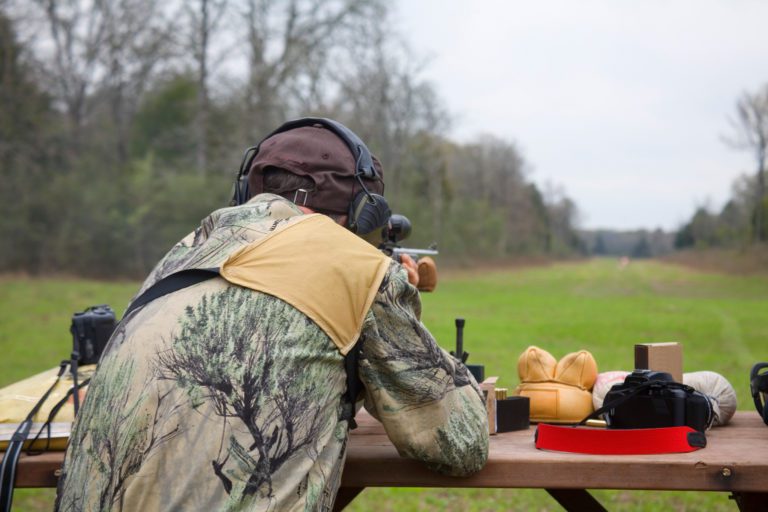We're Here to Answer Your Questions on Gun Cleaning and Full Blast Gear Products
There are a few steps involved in properly cleaning your gun. There are a few differences between cleaning a pistol, rifle, or handgun. It’s important to do your research before attempting to clean a gun on your own. To help get you started, here are a few frequently asked questions.

A: Every time a bullet is shot through the barrel of your gun, it leaves behind residue, most commonly powder, copper and lead. In some cases, the primer in the cartridge itself expels a corrosive residue everywhere, too. Known as residual fouling, over time, it will build upon the inside of your firearm and eventually result in issues such as rust, pitting, and malfunction, all of which can cause serious safety issues.
A: It is highly recommended that a thorough cleaning is performed after each use. In doing this, the risk of damage from residual fouling, or corrosive ammunition is significantly reduced. Each cleaning is a proactive measure in preparedness – it’s always better to take a little extra time and have your firearms spick-and-span than to risk malfunction.
A: It is always suggested that cleaning be done right afterward, but we know that is not always possible. The next best option is, you guessed it, as soon as you are given a chance. It is recommended that you at least quickly clean the bore and breach of your gun right away after shooting. And then give your gun a thorough more complete cleaning preferably within a couple of days. Unless you are using corrosive ammunition, in this case, cleaning as soon as possible is a must. Lucky for you, the Full-Bore Blast Gun Cleaner can be used on the spot wherever you are.
A: Nope, sorry, pal. To properly clean a firearm, it must be disassembled. Manufacturers state field stripping as the farthest level of disassembly needed, but this may not be sufficient for guns used frequently. In this case, a full deep clean is more suitable.
A: Residual fouling is the build-up of remnants left behind from gunpowder and bullets. There are four common types: carbon, copper, lead, and plastic. If not cleaned, the residue can result in loss of accuracy, cause malfunction, rust, pitting, an overall decline in the reliability and value of your firearm.
A: Some cartridges (typically older manufactured ones purchased from surplus stores) contain a primer made with potassium chlorate (aka salt). When fired, the primer will get everywhere that combustion took place: bore, chamber, face, bolt, etc. When the salt, moisture in the air, and metal of your firearm combine, the fast-acting chemical reaction creates rust. The good thing is that newly manufactured ammunition is highly unlikely to contain this primer.
Note: if newly manufactured ammunition is made with corrosive primers, a warning will be listed on the box. You may read “mildly” or “partially” corrosive, but it is just as damaging as “highly.” Corrosive is corrosive, do not fall victim to schemes.
A: YES. The inevitable truth is that firearms are likely to rust if maintenance is negligent, including weapons that are not being used and were stored away. Metal is a magnet for moisture. Rust results in pitting, which can ultimately be the demise of your firearm.
A: A rusted firearm can be repaired, but there are limits. If surface rust is caught early, you can likely do the job at home with time, patience, and elbow grease. Advanced stages of rust result in pitting. A professional gunsmith can repair marginal pitting through a process called bluing. Be warned, this is time-consuming and can become costly, at times considerably exceeding the cost and worth of your firearm.
A: For starters, you need to have a solid, sturdy, flat surface to work. A well-lit space is beneficial as well, considering the many small parts involved. For your health and personal safety, an area that is adequately ventilated is essential. Safety glasses are recommended to protect your eyes from flying springs.
You will only need two cleaning fluids, solvent, and lubricant (oil). Solvents can get tricky, as there are many options to choose from. You want one that will loosen and remove carbon, copper, lead and any other fouling, break down any buildup of oil and dirt, and degrease all surfaces. Fortunately, our Full-Bore Blast Gun Cleaner does all of it in one solvent, rather than two like most others found on the market.
Next are the tools. First, you need a high-quality rod. You will want one that is softer than the metal of your firearm, such as our Flex Rods.
The rods allow for reach through the bore — no excuses for a poorly cleaned firearm.
Second, jags/loops “patch holders.” Attaching to the end of the rod, they traditionally have one purpose: to hold the patch. Our specialized Dual Open-Slotted Tip-Ends are made to keep from scratching the bore while offering use for other functions other than just for patches.
Patches are the third item you will need in your cleaning kit. They play multiple roles in cleaning the bore, action, and frame and can be used to lubricate your firearm.
Brushes are the following item to add. Bore brushes are cylindrical twisted wire brushes that attach to your rod. They are used to clean out the more stubborn fouling the patches alone cannot clean. They come in varying caliber sizes, so you get the best clean possible. Other “toothbrushes” like brushes are also helpful in cleaning out tight spots. Both come with bronze or nylon bristles.
Cleaning mats are optional but a good idea to use. The soft surface helps prevent dinging your gun on a solid workspace and any fluids from getting on surfaces.
A: Yes, yes, and yes. Not using oil on your firearm can lead to several complications. Guns are machines made of moving metal parts. You do not want metal rubbing against metal without anything coating it. Lube is essential – it does not matter your argument. It not only reduces friction and allows your firearm to function correctly, but it also plays a vital role in preventing rust.
A: You never want your gun dripping in oil. All lubricants are different; some last longer, some are tackier – attracting more dirt – and others are thin. The more you clean your firearm, the more you understand how much oil you need in some areas or less in others. You can try different types and find what works best. Whether you plan on storing your firearm for some time or use it frequently, you want a healthy layer of oil to coat your gun, but never so much that it attracts every particle of dust and dirt in the air.
A: Yes. Dangerous in safety to yourself and others in the sense of being a responsible gun owner and reckless in situations when you need to rely on your weapon and it malfunctions. Common hazardous problems that result from a dirty firearm are failure to fire, failure to eject, failure to extract, or even broken, worn-out parts. Broken parts can be noted and repaired through regular cleaning and inspection. There’s simply no responsible excuse for a dirty firearm.
A: Technically speaking, no. You can cause damage to your firearm by not using quality cleaners and tools. Improper cleaning techniques can result in damage. Many people find cleaning their firearms relaxing; as long as it is done well, there’s no harm in a little extra TLC.
A: Absolutely! Most “unused” firearms are tucked away in nightstands or other places around the home in case of emergencies. These places also happen to collect some of the most dust and dirt, settling on and in your firearm. An excellent, thorough deep-clean every six months is recommended.
Just note: it’s always a good idea to practice with all firearms that you own. Being comfortable using all of your weapons is imperative. You will learn if there are any adjustments or issues that need to be addressed with that particular gun, too.
A: ALWAYS unload your firearm and check visually and physically for any ammunition in the chamber before disassembly. Then, check again, and then again – you can never be too cautious. After unloading your gun, be sure to keep ammunition in a location separate from your workspace. Work in a well-lit area. Your workspace should be a flat, sturdy surface clear of any clutter to avoid losing parts, such as pins and springs that may tend to roll away. Find a space that is well ventilated, as most cleaners have strong fumes that can cause you to become lightheaded at least. And most importantly, pay attention to what you are doing, limit distractions.


